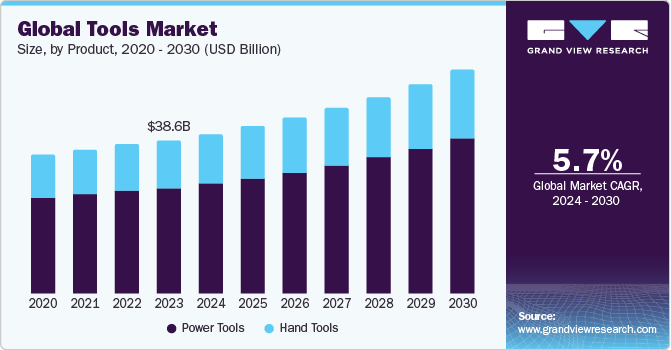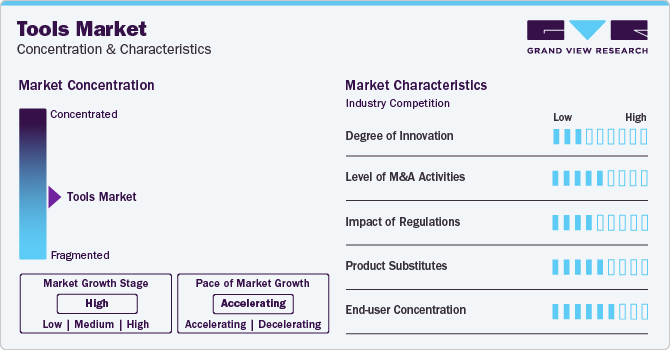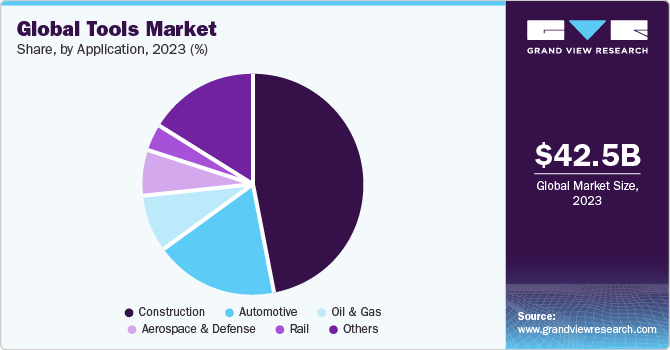
Tools Market Size, Share & Trends Analysis Report By Product (Hand Tools, Power Tools), By Application (Oil & Gas, Automotive, Rail, Aerospace & Defense, Construction), By Region, And Segment Forecasts, 2024 - 2030
- Report ID: GVR-4-68040-261-0
- Number of Report Pages: 120
- Format: PDF
- Historical Range: 2018 - 2023
- Forecast Period: 2024 - 2030
- Industry: Advanced Materials
Tools Market Size & Trends
The global tools market size was estimated at USD 42.50 billion in 2023 and is projected to grow at a CAGR of 5.7% from 2024 to 2030 due to the flourishing end-use industries, such as automotive, aerospace, oil & gas, and construction, across the world. Moreover, the increasing inclination of homeowners toward do-it-yourself (DIY) activities has led to the rising global adoption of cordless power equipment. As governments across the globe are undertaking infrastructure development projects, the demand for power equipment used in construction activities is anticipated to grow. Such initiatives are expected to lead to significant investments in non-residential construction projects, and subsequently drive the demand for power and hand tools. The COVID-19 pandemic took a severe toll on economies across the globe, slowing down consumer spending and disrupting supply chains.

The shutdown of production and manufacturing facilities in the first quarter of 2020 led to a shortage of products and resulted in declined revenues for companies operating in the market. However, the market experienced a resurgence in the latter half of 2020 and most companies registered positive sales growth in 2020. The resurgence was mainly aided by the increased demand for DIY tools, such as cordless power drills and hammers, from residential end-users, and sales through e-commerce platforms. As most people preferred staying at home and engaged themselves in home improvements or remodeling activities, the DIY activities promoted power equipment sales in 2020. The pandemic particularly triggered home improvement spending as staying at home for longer periods promoted interest in DIY activities.
Market Concentration & Characteristics
Market growth stage is medium, and the pace of its growth is accelerating. The industry is fragmented on account of the involvement of many large players with high production capacities. This industry is considered highly competitive on account of the presence of many large-scale manufacturers, functioning at a regional or global level with large product portfolios. To gain a competitive advantage, the companies are continuously investing in various strategies, such as expansions, product launches, collaborations, mergers & acquisitions, and R&D.

The American Society for Testing and Materials (ASTM), the Japanese Industrial Standards (JIS), the Bureau of Indian Standards (BIS), International Standards (ISO), JMAA Standards, Tooling and Equipment Standard (TES), etc. formulate rules, regulations, and standards related to equipment. These regulations and standards have been developed to guide and educate operators to use equipment appropriately and comprehend the possible risks connected with different types of equipment used by them.
Different end-users demand innovative power equipment and hand tools, such as cordless power tools, which are lightweight and easy to use as well as possess smart function properties. Therefore, manufacturers focus on offering single-battery-equipped power tools or smart/connectivity-enabled power equipment. This has led to intense competition in the market, further resulting in continuous R&D activities to introduce innovative equipment to cater to diverse requirements.
Product Insights
The power tools segment led the market and accounted for a share of 69.0% of the global revenue in 2023. It is expected to grow steadily from 2024 to 2030. Power tools are electrical devices that operate on batteries or motors and are available in varied types, such as saws, drills, grinders, wrenches, sanders, and hot guns, according to the applications. These are highly powerful and help complete tasks much faster than hand equipment, which is propelling their demand in different application industries, such as oil & gas, automotive, rail, and aerospace & defense. Moreover, these provide exceptional accuracy for recurring tasks like drilling and cutting.
However, the high price and significant maintenance requirements of power tools compared to hand tools, and the need for proper knowledge to operate them, may hinder segment growth. The hand tools segment accounted for a significant market share in 2023 and is expected to witness considerable CAGR from 2024 to 2030. Hand equipment is mainly utilized in the construction, aerospace, automobiles, railways, DIY sectors, oil & gas, and DIY sectors for a variety of applications including hammering, sawing, and drilling. Despite the continued substitution of hand equipment for power equipment owing to increased demand for precision, efficiency, and performance, hand tools are the most popular tool type across the globe.
Application Insights
The construction application segment led the market and accounted for a share of 49.6% in 2023. Technological advancements have revolutionized construction processes, leading to increased efficiency and precision. The usage of power equipment allows for more accurate measurements, faster completion times, and improved project outcomes. As construction companies strive to stay competitive and meet tight deadlines, they are investing in more precise & efficient tools to streamline their operations and enhance productivity. Power equipment, such as cordless drills, electric saws, and pneumatic nail guns, have become increasingly popular due to their ability to perform tasks quickly and with greater precision. Similarly, hand tools with ergonomic designs and improved durability make tasks easier and more comfortable for workers, contributing to increased efficiency on job sites.

As construction companies seek to optimize their operations and meet tight deadlines, they are investing in these advanced tools to improve productivity and project outcomes. The aerospace & defense segment is expected to grow at the fastest CAGR of 6.4% from 2024 to 2030. The aerospace & defense industry is experiencing a rise in demand for new aircraft, spacecraft, and military equipment driven by geopolitical tensions, national security concerns, and commercial aviation growth. This industry operates under stringent regulatory standards & safety requirements, which necessitate the use of specialized tools & equipment. Aviation authorities & military agencies impose strict guidelines for the design, manufacturing, and maintenance of aerospace & defense systems to ensure compliance with safety & performance standards. This further augments product demand in this industry.
Regional Insights
The tools market in North America is growing on account of the diverse and robust manufacturing sector encompassing industries, such as automotive, aerospace, machinery, electronics, and consumer goods. These industries rely heavily on advanced tools for various stages of production, assembly, and maintenance, further driving product demand.

U.S. Tools Market Trends
The U.S. tools market growth is driven by a strong DIY (do-it-yourself) culture and consumer market. Homeowners, hobbyists, and DIY enthusiasts purchase tools for various projects, renovations, and repairs, driving demand for a wide range of hand tools, power tools, and accessories. Retailers and e-commerce platforms catering to the DIY market play a significant role in distributing tools to consumers, further fueling market growth.
Asia Pacific Tools Market Trends
The tools market in Asia Pacific dominated the global industry in 2023 and accounted for a share of 41.9% of the global revenue. It is expected to continue the trend over the forecast period. This can be attributed to the growing industrialization and construction industry in the region. The rapid industrialization has resulted in manufacturers setting up their production facilities in this region due to the availability of inexpensive labor and raw materials. This is expected to propel the demand for tools.
The China tools industry dominated the Asia Pacific market with a share of 45.0% in 2023. It is growing on account of different manufacturing companies being attracted to China for establishing their production facilities on account of low labor costs, robust business environment, low customs & taxes, and lack of regulatory compliance. This has resulted in the presence of a well-established manufacturing sector with production facilities in several industries, such as electronics, machinery & equipment, automotive, chemicals, energy, medical, and aerospace. This, in turn, has increased the demand for tools in the country.
The tools industry in India is driven by favorable government initiatives to boost the growth of different industries under its ‘Make in India’ scheme. For instance, the launch of the Automotive Mission Plan (AMP) 2026 aims at establishing the country as a global manufacturing hub for automotive and its components. This is expected to propel product demand in India at a CAGR of 7.7% from 2024 to 2030.
Europe Tools Market Trends
The Europe tools market accounted for a significant share of the global tools market in 2023. This region comprises many developed economies, which have established markets for different industries, such as aerospace & defense, oil & gas, and automotive sectors, which positively influences the demand for tools in this region.
The tools market in Germany is growing at a CAGR of 5.0% from 2024 to 2030 on account of the presence of a well-developed automotive sector and large-scale automobile manufacturers in the country.
Middle East & Africa Tools Market Trends
The Middle East & Africa tools marketis expected to grow at a significant rate over the years owing to flourishing oil & gas, construction, and automotive application industries in the region that are key consumers of the product.
The tools market in Saudi Arabia is experiencing rapid growth driven by the country's economic diversification efforts, infrastructure development projects, and expanding manufacturing sector. The combination of economic diversification efforts, infrastructure development projects, expanding manufacturing sector, population growth, and government initiatives to promote entrepreneurship drive market growth.
The Central & South America tools market is experiencing growth driven by several key factors that contribute to the region’s economic development, industrialization, and infrastructure projects. Moreover, the region’s thriving DIY (do-it-yourself) culture and consumer market contribute to market growth.
The tools market in Brazil is driven by large-scale infrastructure projects, including the construction of roads, bridges, airports, ports, and stadiums. Moreover, Brazil's growing manufacturing sector is contributing to market growth.
Key Tools Company Insights
Some of the key players operating in the market are Emerson Electric Co. and Hilti Corporation:
-
Emerson Electric Co. designs and manufactures products and delivers services to industrial, commercial, and consumer markets. The company’s products and services cater to the requirements of various industries, such as automotive, industrial energy & onsite utilities, engineered solution providers, power, chemical, life sciences & medical, and oil & gas
-
Hilti Corp. is a technology company focused on product development and manufacturing, logistics, sales, and servicing of technological equipment. The company’s major business areas include anchor systems, power tools & systems, measuring systems, tool services, fastening solutions, and firestop systems
Zhejiang SALI Abrasive Technology Co., Ltd., and Apex Tool Group are some of the emerging participants in the market.
-
Zhejiang SALI Abrasive Technology Co., Ltd. manufactures abrasive power tools. The company offers over 2,000 products under its SALI brand in Asia Pacific, South America, Africa, Europe, and the Middle East
-
Apex Tool Group produces hand tools and power tools for use in energy, marine, aerospace, electronics, motor vehicles, and industrial applications. The company distributes its hand tools through five major brands, namely, SATA, Campbell, GEARWRENCH, Crescent, and Jacobs
Key Tools Companies:
The following are the leading companies in the tools market. These companies collectively hold the largest market share and dictate industry trends.
- Emerson Electric Co.
- Hilti Corporation
- Zhejiang SALI Abrasive Technology Co., Ltd.
- Apex Tool Group
- Makita Corporation
- Stanley Black and Decker Inc.
- Robert Bosch GmbH.
- Husqvarna AB
- Snap-on Incorporated
- KOKI HOLDINGS Co., Ltd.
- Armstrong Tools Inc,
- Falcon Garden Tools Ltd.
- Bully Tools
Recent Development
-
In October 2020, Hilti Corp. introduced a semi-autonomous ceiling drilling robot that uses Building Information Modeling (BIM) to perform construction-related tasks. This helped customers increase the utilization of digital technologies in the construction business to improve efficiency
-
In April 2021, Makita Corp. launched the new XGT system, which has over 50 cordless tools and equipment for various applications. XGT series cordless tools feature the latest technical advancements from Makita’s technology centers
Tools Market Report Scope
|
Report Attribute |
Details |
|
Market size value in 2024 |
USD 44.24 billion |
|
Revenue forecast in 2030 |
USD 61.84 billion |
|
Growth rate |
CAGR of 5.7% from 2024 to 2030 |
|
Historical data |
2018 - 2023 |
|
Forecast period |
2024 - 2030 |
|
Quantitative units |
Revenue in USD million/billion and CAGR from 2024 to 2030 |
|
Report coverage |
Volume & Revenue forecast, company ranking, competitive landscape, growth factors, and trends |
|
Segments covered |
Product, application, region |
|
Region scope |
North America; Europe; Asia Pacific; Central & South America; Middle East & Africa |
|
Country scope |
U.S.; Canada; Mexico; UK; Germany; France; Italy; Spain; China; India; Japan; Brazil; Saudi Arabia |
|
Key companies profiled |
Emerson Electric Co.; Hilti Corp.; Zhejiang SALI Abrasive Technology Co., Ltd.; Apex Tool Group; Makita Corp.; Stanley Black and Decker Inc.; Robert Bosch GmbH; Husqvarna AB; Snap-on Inc.; KOKI HOLDINGS Co., Ltd.; Armstrong Tools Inc.; Falcon Garden Tools Ltd.; Bully Tools |
|
Customization scope |
Free report customization (equivalent up to 8 analysts’ working days) with purchase. Addition or alteration to country, regional & segment scope. |
|
Pricing and purchase options |
Avail customized purchase options to meet your exact research needs. Explore purchase options |
Global Tools Market Report Segmentation
This report forecasts revenue growth at global, regional, and country levels and provides an analysis of the latest trends in each of the sub-segments from 2018 to 2030. For this study, Grand View Research has segmented the tools market report based on product, application, and region:

-
Product Outlook (Revenue, USD Million, 2018 - 2030)
-
Power Tools
-
Hand Tools
-
-
Application Outlook (Revenue, USD Million, 2018 - 2030)
-
Oil & Gas
-
Automotive
-
Rail
-
Aerospace & Defense
-
Construction
-
Others
-
-
Regional Outlook (Revenue, USD Million, 2018 - 2030)
-
North America
-
U.S.
-
Canada
-
Mexico
-
-
Europe
-
UK
-
Germany
-
France
-
Italy
-
Spain
-
-
Asia Pacific
-
China
-
India
-
Japan
-
-
Central & South America
-
Brazil
-
-
Middle East & Africa
-
Saudi Arabia
-
-
Frequently Asked Questions About This Report
b. The global tools market size was estimated at USD 42.50 billion in 2023 and is expected to reach USD 44.24 billion in 2024.
b. The global tools market is expected to grow at a compound annual growth rate of 5.7% from 2024 to 2030 to reach USD 61.84 billion by 2030.
b. Power tools segment dominated the market and accounted for more than 31.0% share of the global revenue in 2023. This is on account of growing adoption of power tool over hand tools in different industries including construction, oil & gas and automotive
b. Some of the key players operating in the tools market include Emerson Electric Co., Hilti Corporation, Zhejiang SALI Abrasive Technology Co., Ltd., Apex Tool Group, Makita Corporation, Stanley Black and Decker Inc., Robert Bosch GmbH., Husqvarna AB, Snap-on Incorported, KOKI HOLDINGS Co., Ltd., Armstrong Tools Inc,, Falcon Garden Tools Ltd., and Bully Tools
b. The key factors driving the tools market include growing construction industry in the developing countries around the world
We are committed towards customer satisfaction, and quality service.
"The quality of research they have done for us has been excellent."




